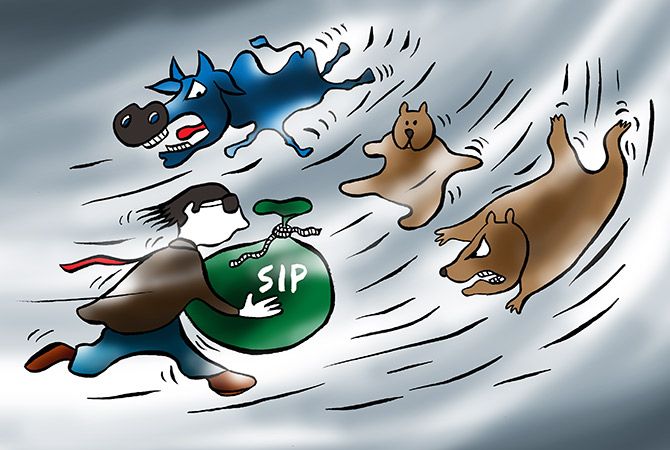'Investors buy more when markets are cheap and sell when markets are expensive and the same gets replicated in our SmartSIP while keeping all the discipline of SIPs,' says Omkeshwar Singh, head, RankMF, about their flagship scheme.
Illustration: Uttam Ghosh/Rediff.com

Move over SIPs (systematic investment planning), SmartSIP is here.
It's 'smart' because this method of investing -- very much like the SIPs in its discipline -- involves automatic reallocation of your SIP instalments so that investors make returns superior to their SIP returns.
And, how exactly is this achieved?
Unlike your systematic investment plan, SmartSIP undertakes buying more (and doubling their investments) when markets are inexpensive or undervalued; by holding and continuing to invest when markets are fairly valued; and by selling when markets are very expensive and avoiding new investments.
But not all mutual fund investors can figure out when the markets are undervalued, fairly valued or overvalued, and fashion their SIPs accordingly.
That's where RankMF, a mutual fund research and investment platform, can help MF investors by providing them with SmartSIP, a web-based tool that claims investors can earn additional 4.5 per cent per annum (average) by following their investing principle compared to what they make from traditional SIPs.
Omkeshwar Singh, head, RankMF, in an interview with Rediff.com's Prasanna D Zore explains how this method of investing can create more wealth for MF investors.
How does RankMF platform work? How can MF investors become part of RankMF platform?
RankMF research has rated each and every stock/underlying instrument considering over 20 million data points which includes both fundamental as well as technical parameters and evaluates each and every scheme's portfolio 'quality'.
Once the first major filter of quality of the portfolio is cleared, the second major filter of investing is whether a scheme has margin of safety -- simply put: value for money -- and therefore should be invested in or not.
RankMF's proprietary tool MosDEX (Margin of Safety Index) uses qualitative and quantitative parameters to determine a scheme's intrinsic value. The scheme NAV is used as a reference point to compare if the margin of safety is high or low.
RankMF completely ignores the below parameters for rating and ranking of mutual funds schemes:
- Past performance
- The brand of AMC or fund manager
- Outdated Bell Curve rating methodology
Investors can register themselves online on the platform and the complete registration process is paperless and can be completed within five minutes.
Do investors have to actively manage their MF portfolios or will RankMF do it automatically?
Investors are required to manage their MF portfolio themselves based upon the RankMF research and ratings guidance.
RankMF's SmartSIP and SmartSIP+ has automated management of the selected equity scheme for SmartSIP, but that is restricted to same equity scheme and related liquid fund based upon the RankMF SmartSIP published level of margin of safety levels.
How can RankMF claim that its SMART SIP is better than ordinary SIP that MF investors have been doing till now?
Let's examine investments via SIP (systematic investment plan) and if it is optimal investment mode.
Underlying assumptions around investment via SIP mode are:
- SIP is a disciplined investment mode, that is, every month fixed amount gets invested on a fixed date
- Money for the SIP is collected through auto debit facility or mandate, therefore skipping SIP instalments has cost (bank charges), therefore financial discipline is also adhered to
- Since small amount gets invested every month, there is no requirement to 'time the market', rupee cost averaging and power of compounding kicks in and in long run decent corpus should be created
- In long run everyone will always make money
But, what is long run for retail investors? 3 years, 5 years, 10 years, 15 years or more?
- There have been many periods where the returns of 5-year SIP or 10-year SIP or 15-year SIP with not only sub-FD returns but also occasionally negative or no returns
- With increase in duration of SIP the chances of losses decrease, that is, the risk of loss reduces
- Not all SIPs in all schemes can create wealth, selection of right MFs is very important to achieve the desired objectives / goals
- Normal SIP investors will continue to invest the same amount irrespective of scheme being expensive or fairly valued or undervalued. Is this what smart investors do?
In fact, smart investors must do what institutional investors do:
- Buy more when markets are inexpensive or undervalued (double their investments)
- Hold and continue investing when markets are fairly valued
- Sell when markets are very expensive and avoid new investments
Therefore, SIP is not smart investing; it's simply disciplined automated investing!
This is how RankMF differs from ordinary SIPs:
- RankMF SmartSIP invests your monthly SIP amount in equity mutual funds units when the markets are fairly valued and doubles your monthly SIP amount when markets are very undervalued
- RankMF SmartSIP skips fresh investments in equity schemes when markets are expensive and books profits/sells a part of your existing equity units when markets are very expensive. The sale proceeds and monthly instalment are invested in liquid schemes
- RankMF SmartSIP skips your investment in equity scheme units and parks the SIP amount in liquid schemes which is later used to buy equity MF units when markets become inexpensive
So, investors buy more when markets are cheap and sell when markets are expensive and the same gets replicated in RankMF SmartSIP while keeping all the discipline of SIPs.
What is the cost involved for investors when RankMF automatically switches between liquid funds and MF equity SIPs?
There is no cost attached; the Total Expense Ratio (TER) applicable will be lower than that of normal equity SIP. Normal SIP will always be investing in the selected equity schemes irrespective of markets being expensive or fairly valued or undervalued, therefore the TER applicable will be that of the equity scheme.
In case of RankMF SmartSIP, when markets are expensive or very expensive the instalments amount and part of equity holding will be sold to book profits and park the monies in liquid fund.
The TER of liquid fund is considerably much lower than that of equity schemes. Therefore the effective TER of RankMF SIP will be lower than that of normal equity SIPs.
There is no transactions cost involved as the entry load is NIL for both equity scheme and liquid scheme. Further, there is no exit load in liquid fund or equity fund after 12 months of holding period.
The equity scheme and the liquid scheme is selected at the time of the registration of the SmartSIP and depending upon the RankMF Margin of Safety Index, the instalment is invested into selected equity Scheme or the selected liquid scheme.
You claim that investing through RankMF can provide investors 4.5 per cent returns more than their ordinary SIP investments? Could you describe in detail how this happens?
There are 3 components to this:
- Buy more when markets are inexpensive or undervalued (double their Investments): this part of RankMFSmartSIP strategy helps generate nearly 2 per cent to 2.5 per cent in one market cycle
- Hold and continue investing when markets are fairly valued: this part is similar to that of normal SIP
- Sell when markets are very expensive and avoid new investments: this part of the strategy of RankMFSmartSIP helps generate 2 per cent to 2.5 per cent in one market cycle
In nutshell, RankMF is built on a simple principle that investments in great companies at fair or great prices delivers great returns and investments in poor companies and/or at poor prices delivers poor returns. This is true for both equity and debt instruments of companies.











